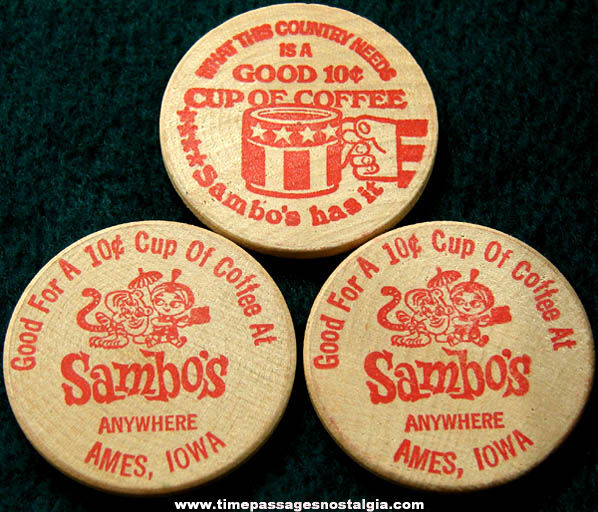
   | | Any group of items being offered as a lot must be sold as a lot. | | | Don't forget to
bookmark this site. | | Combined Shipping And Handling | You don't have to be an eight year old to enjoy having
a childhood treasure. | | Unique & Fun Nostalgic Items | Nostalgic Memorabilia, Pop Culture Artifacts, Historic Items,
and "Shoe Box Toys" | Quantity Discount Prices
(when available) | | Fast Dependable Service | All Original Items.
No Reproductions |
| | | | The picture shows a view of all (3) 1970s Sambo's Restaurant Coffee Advertising Wooden Token Coins in this lot. All three of these are identical. One was flipped over to show the other side. They are wooden and have red print. On one side they picture the 1970s Sambo with a Tiger character. On the other side there is an American flag coffee cup and a hand (Uncle Sam ?). They are marked on the two sides as follows: GOOD FOR A 10c CUP OF COFFEE AT
SAMBO'S ANYWHERE
AMES, IOWA WHAT THIS COUNTRY NEEDS IS A
GOOD 10c CUP OF COFFEE
SAMBO'S HAS IT The wooden nickels, or dimes in this case, each measure 1-1/2'' wide. They appear to be in mint condition as pictured. Below here, for reference, is a short History of Sambos Restaurant: Sambo's
From Wikipedia, the free encyclopedia Sambo's is a restaurant, formerly an American restaurant chain, started in 1957 by Sam Battistone and Newell Bohnett. Though the name was taken from portions of the names of its founders, the chain soon found itself associated with The Story of Little Black Sambo. Battistone and Bohnett capitalized on the coincidence by decorating the walls of the restaurants with scenes from the book, including a dark skinned boy, tigers and a pale, magical unicycle riding man called ''The Treefriend.'' By the early 1970s, the illustrations depicted a light skinned boy wearing a jeweled Indian style turban with the tigers. A kids club, Sambo's Tiger Tamers (later called the Tiger Club), promoted the chain's family image. History By 1979, Sambo's had 1,200 outlets in 47 U.S. states. However, in the late 1970s, controversy over the chain's name drew protests and lawsuits in communities that viewed the term Sambo as pejorative towards African Americans, particularly in the Northeastern states. Several of the restaurants were opened as or renamed to ''The Jolly Tiger'' in locations where the local community passed resolutions forbidding the use of the original name or refused to grant the chain permits. In March 1981, in a further attempt to give the chain a new image the company again renamed some locations, this time to ''No Place Like Sam's''. By November 1981, the company filed for bankruptcy. Neither the name change nor bankruptcy protection reversed the downward trend, and in 1982 all but the original Sambo's at 216 West Cabrillo Boulevard in Santa Barbara, California, closed their doors. 618 of the locations were renamed Season's Friendly Eating by February 1983. Battistone is also the original owner of the New Orleans Jazz in the NBA. He later moved the team to Utah and sold it. Battistone's grandson, restaurateur Chad Stevens, owns the original and only remaining Sambo's. |
|
Click on image to zoom.
 |